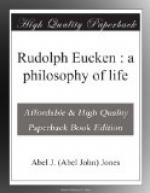“
Ab is a straight line between A and B,”
and conclude that the line
ab represents the
shortest distance between two points A and B. In a
manner similar to this Euclid built his whole mathematical
system upon the basis of definitions and postulates,
a system the complexity and thoroughness of which
has caused all students of mathematics at one time
or another to marvel and admire. But, of course,
a definition is little more than assigning a definite
term to a definite thing. It is when we begin
to consider the premises that are necessary for arriving
at the profound truths of the universe that we find
the weakness of rationalism. How are we going
to be provided with premises for this end? Shall
we begin by saying “There is a God” or
“There is no God”? How is the pure
reasoning faculty to decide upon the premises in the
matter of the great Beyond? We may weigh the arguments
for and against a certain position, and we may think
that the probability lies in a certain direction,
but to decide finally and with certainty by mere cold
logical reasoning is impossible. We may bring
out into prominence through logical reasoning truths
that were previously only implicit, but to arrive
at absolute truth with regard to the invisible world,
through intellect alone, has long been admitted to
be an impossibility. The illusion of those who
would believe that truth which was not already implied
in the premises could ever be obtained by mere intellectual
reasoning has long since been dispelled.
Perhaps it comes as a shock to the reader who has
always insisted upon a clear intellectual understanding
and a rigid reasoning upon all things, to find within
what narrow limits, after all, the intellect itself
has to work—it can do little more than
make more or less certain generalisations concerning
the world of experience, and then to argue from these,
or from definitions that it itself has framed.
Of course some of the ancient philosophers did try
through a course of rigid reasoning to solve the great
problems, and for a long time it was customary to
expect that all philosophers should proceed in the
same way.
Modern philosophers, of whom William James, Bergson,
and Eucken are conspicuous examples, have appreciated
the futility of such a task, and have sought other
means of solving the problem. The mistake in the
past has been to forget that the intelligence is but
one aspect of human life, and that the experience
of mankind is far more complicated a matter than that
of mere intellect, and not to be solved by intellect
alone. Intellect has to play a definite part in
human life, but it does not constitute the whole of
life. Life itself is far greater than intellect,
and to live is a far more important thing than to know.
The great things are life and action; knowledge is
ultimately useful in so far as it contributes to the
development of life and the perfection of action.
Philosophers have for too long a period made knowledge




